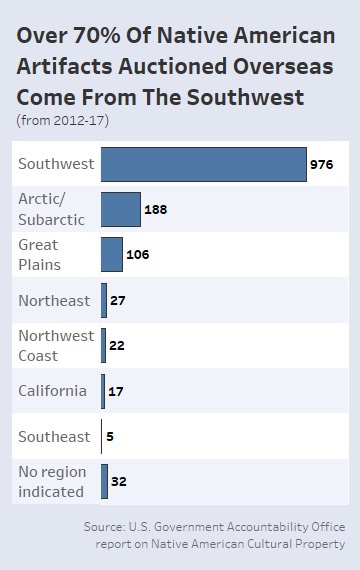By Joyce Hanson
Law360 (October 23, 2018, 4:55 PM EDT) -- A bill designed to stop the international trafficking of federally protected tribal cultural heritage artifacts has landed in the U.S. House following the release of a Government Accountability Office report on overseas auction sales of Native American cultural items, particularly from the Southwestern states.
Rep. Steve Pearce, R-N.M., introduced H.R. 7075 on Friday, proposing the Native American and Native Hawaiian Cultural Heritage Protection Act of 2018 to help prevent the sort of illegal theft and sale of tribal cultural items that have already surfaced in various auction houses across Europe and to bring the artifacts back home to American Indians, Alaska Natives and Native Hawaiians.
 The key purpose of the proposed bill is to stop the exportation of Native American and Native Hawaiian items obtained in violation of the Archaeological Resources Protection Act, the Native American Graves Protection and Repatriation Act, or the 1906 Antiquities Act.
The key purpose of the proposed bill is to stop the exportation of Native American and Native Hawaiian items obtained in violation of the Archaeological Resources Protection Act, the Native American Graves Protection and Repatriation Act, or the 1906 Antiquities Act.
“After leading a bipartisan effort to condemn the illegal theft and sale of tribal cultural items which have surfaced in various auctions across Europe, I am confident that this bill will help bring these items back to their respective homes where they belong, while preventing future items from being illegally exported,” Pearce said in a statement.
The 114th Congress of 2015-2016 passed a resolution in support of efforts to stop the theft, illegal possession, sale and export of tribal artifacts.
In June 2016, Pearce, House Judiciary Committee chairman Bob Goodlatte, R-Va., and Rep. James Sensenbrenner, R.-Wis., sent a letter to the GAO requesting that it look into the illegal looting of Native American archaeological and historical sites. People involved with those crimes either keep the items for their personal enjoyment or traffic them to collectors or museums, the letter said.
The GAO released the report of its findings in August 2018, saying that no federal law explicitly prohibits the export of Native American cultural items, thus “creating a challenge for tribes because they cannot easily prove that the items were exported from the United States illegally.”
Agency officials with the U.S. departments of Homeland Security, Interior, Justice and State have informally worked together to help tribes repatriate items from overseas auctions via an interagency group established in 2015, but the group hasn’t formalized any collaboration practices, the GAO concluded. The report offered 12 recommendations to the four agencies, specifying how they should implement best practices and communicate with the tribes.
Pearce said the proposed bill is historic because it reflects a first-of-its kind collaborative process between tribes and dealers. He credited the Pueblo of Acoma’s work in New Mexico for bringing the issue of stolen artifacts to light.
“To see a sacred item in a foreign auction and to be told there is nothing that can be done to stop the sale is a terrible experience. We hope Rep. Pearce’s bill will help to prevent that situation in the future,” Kurt Riley, governor of the Pueblo of Acoma, said in a statement Friday.
The GAO’s analysis shows that the majority of Native American items in overseas auctions between 2012 and 2017 came from the Southwestern states, at 976 items. By comparison, the second most sold items came from the Arctic-Subarctic region, at a total of 188 items auctioned.
The nation’s largest tribal art dealer organization, the Antique Tribal Art Dealers Association, said Friday in a statement that H.R. 7075 will join the tribes and art market participants together to properly address the tribes’ valid claims “while recognizing the importance of a vibrant art market to New Mexico’s economy.”


